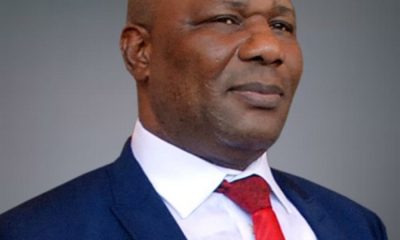Business News
Portfolio Investment Firms Cry Out, N1trn Assets Under Threat

By Orkula Shaagee, Abuja
Portfolio investment Managers in the nation’s economy have raised the alarm over alleged collusion between banks and security officials with the support of some officials of the Central Bank of Nigeria (CBN) to squeeze them out of business.
Chief Executive Officers of some Portfolio investment firms said at least N1trillion fund is under threat as officials of the apex bank have begun a silent clamp down on operators in the sub-sector.
Portfolio Investment managers are retail fund managers who mobilise term deposits from clients and pay out attractive interests at expiration of specific tenures usually from 30-90 days but sometimes for longer periods.
The portfolio investment managers, who operate in the downstream segment of the financial services sector, are spread across the country with thousands of depositors or investors in their clientele.
Investigations revealed that following the recent exponential growth of the business, the deposit money banks became threatened as the portfolio investment managers appeared to be mobilizing higher deposits than the banks in relation to the size of the firms in the sector.
Investigations also revealed that depositors, mostly in the low and middle income brackets, weary of the many hidden and exorbitant charges in the banking system, may have abandoned the banks and instead opted to place their deposits with the portfolio investment managers, whose operations were found to be less cumbersome, time saving and yielding higher returns on investments.
A typical portfolio investment managing firm pay up to 30 per cent interest on deposits depending on the duration of tenure and size of investment.
It was learnt that by end of 2020, the Portfolio Investment management firms had over 2,000,000 clients with investments worth at least N1trillion.
Worried by this development, the Deposit Money banks were said to have colluded wth some officials in the CBN to move against the firms.
The banks, were also said to have used the police and other security agencies like the Economic and Financial Crimes Commission (EFCC), the Nigerian Financial Intelligence Unit and Securities and Exchange Commission (SEC)to harass some operators of the firms, whom they accused of running a parallel economy.
Investigations revealed that some operators of the firms have come under constant harassment by security officials with some of them arrested and detained last year, while some of them had their bank accounts placed under suspension.
One of such companies based in Port Harcourt, the Rivers State capital with at least 1000 staff was affected by the clampdown as its accounts with one of the banks were also frozen, a source confirmed to our Correspondent.
The security agencies were said to have hurriedly obtained Court orders with which they used to clampdown on the firms.
A source close to some owners of the firms claimed they were treated harshly by the CBN and not given fair hearing in the whole process, adding that the Court Orders used to clampdown on the firms were hurriedly obtained and may have been lacking in due process.
The source also disclosed that the operators have made repeated appeals to the CBN to set up a regulatory system for the portfolio managers to no avail, adding that the banks were bent on frustrating any move to bring the market segment under proper regulation.
“In 2019, 149 portfolio investment managers were ready to register with the Securities and Exchange Commission (SEC) in the absence of a specific regulator for the sector, at the end, only two applications were approved and the rest were ignored,” the source stated. It was alleged that the only two that scaled through belongs to some officials of some regulatory agencies.
He said it was a thing of regret that CBN was denying the nation the benefits of bringing the sector under formal regulation like payment of taxes, employment generation and income generation for investors.
“I can assure you that some families are now depending on these investments to pay house rents, school fees and meet other family obligations,” an operator who wanted to remain anonymous told our Correspondent, regretting that such families were being denied their livelihoods.
He said in other climes like United Arab Emirates(UAE), the authorities had not only brought the portfolio investment operators under regulations but had categorized them in wholesale and retail segments depending on the size of their operations to derive the full benefits for the economy.
“Our view is that the banks are unduly scared of our activities, they don’t understand how we are succeeding in a market where they are failing, this is the only reason we are facing persecution,” the source explained.
He wondered why a sector that was providing income opportunities for Nigerians in the face of growing unemployment will be the target by government officials and agencies.
He called on President Muhammadu Buhari and the National Assembly to intervene and save the portfolio managers from further harassment by security officials, the banks and and some collaborators in the CBN.
“We need the President and members of the National Assembly to come to our aid to protect many people who will lose their jobs if the clampdown on our operations continue,” he appealed.
Business News
Tinubu Congratulates Dangote on World Bank Appointment

By Jennifer Enuma, Abuja
President Bola Tinubu has congratulated Alhaji Aliko Dangote, the President of Dangote Group, on his appointment to the World Bank’s Private Sector Investment Lab, a body tasked with promoting investment and job creation in emerging economies.
In a statement by Special Adviser on Media and Publicity, Bayo Onanauga, the President described the appointment as apt, given Dangote’s rich private sector experience, strategic investments, and many employment opportunities created through his Dangote Group.
The Dangote Group became one of Africa’s leading conglomerates through innovation and continuous investment.
Dangote Group’s business interests span cement, fertiliser, salt, sugar, oil, and gas. However, the $20 billion Dangote Petroleum Refinery and Petrochemicals remains Africa’s most daring project and most significant single private investment.
“President Tinubu urges Dangote to bring to bear on the World Bank appointment his transformative ideas and initiatives to impact the emerging markets across the world fully” the statement said.

The World Bank announced Dangote’s appointment on Wednesday, as part of a broader expansion of its Private Sector Investment Lab. The lab now enters a new phase aimed at scaling up solutions to attract private capital and create jobs in the developing world.
The CEO of Bayer AG, Bill Anderson, the Chair of Bharti Enterprises, Sunil Bharti Mittal, and the President and CEO of Hyatt Hotels Corporation, Mark Hoplamazian, are on the Private Sector Investment Lab with Dangote.
The World Bank said the expanded membership brings together business leaders with proven track records in generating employment in developing economies, supporting the Bank’s focus on job creation as a central pillar of global development.
Business Analysis
Nigeria Customs Generates over N1.75trn Revenue in 2025
By Joel Oladele, Abuja
The Nigeria Customs Service (NSC) has generated an impressive N1,751,502,252,298.05 in revenue during the first quarter of 2025.
The Comptroller-General (CG) of the Service, Bashir Adeniyi, disclosed this yesterday, during a press briefing in Abuja.
According to Adeniyi, the achievement not only surpasses the quarterly target but also marks a substantial increase compared to the same period last year, reflecting the effectiveness of recent reforms and the dedication of customs officers across the nation.
“This first quarter of 2025 has seen our officers working tirelessly at borders and ports across the nation.
I’m proud to report we’ve made real progress on multiple fronts—from increasing revenue collections to intercepting dangerous shipments,” Adeniyi stated.He attributed this success to the reforms initiated under President Bola Tinubu’s administration and the guidance of the Honourable Minister of Finance and Coordinating Minister of the Economy, Olawale Edun.
The CG noted that the revenue collection for Q1 2025 exceeded the quarterly benchmark of N1,645,000,000,000.00 by N106.5 billion, achieving 106.47% of the target. This performance represents a remarkable 29.96% increase compared to the N1,347,705,251,658.31 collected in Q1 2024.
Adeniyi highlighted the month-by-month growth, noting that January’s collection of N647,880,245,243.67 surpassed its target by 18.12%, while February and March also showed positive trends.
“I’m pleased to report the Service’s revenue collection for Q1 2025 totaled N1,751,502,252,298.05.
“Against our annual target of N6,580,000,000,000.00, the first quarter’s proportional benchmark stood at N1,645,000,000,000.00. I’m proud to announce we’ve exceeded this target by N106.5 billion, achieving 106.47% of our quarterly projection. This outstanding performance represents a substantial 29.96% increase compared to the same period in 2024, where we collected N1,347,705,251,658.31.
“Our month-by-month analysis reveals even more encouraging details of this growth trajectory,” Adeniyi said.
In addition to revenue collection, Adeniyi said the NCS maintained robust anti-smuggling operations, recording 298 seizures with a total Duty Paid Value (DPV) of ₦7,698,557,347.67.
He stated that rice was the most seized commodity, with 135,474 bags intercepted, followed by petroleum products and narcotics.
“From rice to wildlife, these seizures show our targeted approach,” Adeniyi remarked, noting the NCS’s commitment to combating smuggling and protecting national revenue.
Adeniyi also highlighted key initiatives, including the expansion of the B’Odogwu customs clearance platform and the launch of the Authorized Economic Operators Programme, which aims to streamline processes for compliant businesses. The NCS’s Corporate Social Responsibility Programme, “Customs Cares,” was also launched, focusing on education, health, and environmental sustainability.
Despite these achievements, the CG noted that the NCS faced challenges, including exchange rate volatility and non-compliance issues. Adeniyi acknowledged the need for ongoing adaptation and collaboration with stakeholders to address these challenges effectively.
Looking ahead, the NCS aims to continue its modernization efforts and enhance service delivery, ensuring that it remains a critical institution in Nigeria’s economic and security landscape.
“Results speak louder than plans; faster clearances through B’Odogwu, trusted traders in the AEO program, and measurable food price relief from our exemptions. We’ll keep scaling what works,” he concluded.
BUSINESS
NSIA Net Assets Hit N4.35trn in 2024
By Tony Obiechina Abuja
The Nigeria Sovereign Investment Authority (NSIA) yesterday disclosed that its net assets grew from N156bn in 2013 to N4.35 trillion in 2024.
Similarly, the Authority has remained profitable for 12 consecutive years, leading to cumulative retained earnings of N3.
74 trillion in 2024.Managing Director and Chief Executive Officer of NSIA, Aminu Umar- Sadiq made these disclosures at a media engagement in Abuja, highlighting its audited financial results for the 2024 fiscal year.
According to him, the results underscored the resilience of the authority’s investment strategy and the strength of its earnings, driven by a well-diversified revenue base and robust risk management practices, despite a challenging global macroeconomic and geopolitical environment.
Total operating profits, excluding share of profits from associates and Joint Venture (JV) entities, increased from N1.17 trillion in 2023 to N1.86 trillion in 2024, driven by the strong performance of
NSIA’s diversified investment portfolio, infrastructure assets, gains from foreign exchange movements, and derivative valuations.
In addition, Total Comprehensive Income (TCI), inclusive of share of profits from associates and JV entities, reached N1.89 trillion in 2024, reflecting a 59 per cent increase from N1.18 trillion in 2023.
Core TCI (excluding foreign exchange and derivative valuation gains) rose by 148 per cent to N407.9 billion in 2024 compared to N164.7 billion in 2023, supported by robust returns on financial assets measured at fair value through profit and loss, including collateralised securities, private equity, hedge funds, and Exchange-Traded Funds (ETFs).
Umar-Sadiq said the authority’s outstanding financial performance in 2024 reflected the “strength of our strategic vision, disciplined execution and unwavering commitment to sustainable socio-economic advancement.”
He said, “By leveraging innovation, strategic partnerships and sound risk management, we have not only delivered strong returns but also created value for our stakeholders
“As we move forward, we remain focused on driving economic transformation, expanding opportunities, scaling transformative impact and ensuring long-term prosperity for current and future generations of Nigerians.”
The CEO reaffirmed the authority’s commitment to managing the country’s SWF, and delivering the mandates enshrined in the NSIA Act.
He said NSIA remained poised to continually create long-term value for its stakeholders by delivering excellent risk-adjusted financial results, developing a healthy and well-diversified portfolio of assets and large-scale infrastructure projects, and enhancing the desired social outcomes.
He noted that NSIA was committed to its mandate of prudent management and investment of Nigeria’s sovereign wealth.
“In adherence to its Establishment Act, NSIA prioritises transparency, disclosure, and effective communication with all stakeholders and counterparties,” he said.
He pointed out that in the year under review, a new board, led by Olusegun Ogunsanya as Chairman, was appointed by President Bola Tinubu, in accordance with the provisions of the NSIA Act.
The new board will provide strategic direction and oversight, in addition to playing a pivotal role in critical decision making.
He remarked that under the guidance of the Board, the Authority will retain focus on its primary mandate of creating shared value for all stakeholders based on its continued adoption of corporate governance practices.
“NSIA prides itself an investment institution of the federation established to manage funds in excess of budgeted oil revenues and its mission is to play a pivotal role in driving sustained economic development for the benefit of all Nigerians through building a savings base for the Nigerian people, enhancing the development of the county’s infrastructure, and providing stabilisation support in times of economic misadventure,” he added.



























